Weekly Open Gaming Recap
As you might have guessed, I played boardgames yesterday during open gaming over at my Friendly Local Gaming Store. While assembling the list from sketchy memories and poor quality cell phone images, I realized that this week's lineup has a fair number of famous names and awards. During the tour, please keep your arms and legs inside the moving blog at all times, and please hold all questions until the end.
Starting things off light, Dan and I played a quick two-player game of Oceania (BGG, BUY ME!) as a warm up. You may have heard of the designer, a retired dentist who has won four Spiel des Jahres- including a small diversion called the Settlers of Catan. Oceania is a two-player simplified version of another one of Teuber's games called Entdecker, as I understand. This game is a very light luck-heavy game of ocean-going exploration and territory claiming. Dan dubbed it "a sort of reverse Carcassone" since you can easily block off areas and prevent your opponent from claiming islands and scoring points. You're supposed to play three rounds and tally scores, but we only played one round after viciously preventing each other from claiming any completed islands at all. The rules had a few ambiguities, most of which made plenty of sense after watching the online tutorial. The game also offers solitaire play. I got this as a trade, and I'm pretty pleased. Nothing super deep, but a nice way to start things moving.  We also cut Oceania short because Kelly had shown up from the bookstore, plus New Dan brought a crate of things to play. Due to a phone call, Dan, Kelly, and I (but not new Dan) settled in for a three-player game of
We also cut Oceania short because Kelly had shown up from the bookstore, plus New Dan brought a crate of things to play. Due to a phone call, Dan, Kelly, and I (but not new Dan) settled in for a three-player game of
Primordial Soup (BGG, BUY ME!), an open box demo at Great Hall. Last week, I saw that four non-regular people had set up with this title and said that they had a good time, so I was optimistic. Each player is a species of amoeba, eating, excreting, and evolving for survival- and points. The game has a clever mechanic of shifting currents in the soup- each round the direction changes, and amoebas may drift or pay a Biological Point to (roll and) move, hopefully in a more desirable direction. But players use these same BPs to purchase genes, which function as player powers to differentiate their species as well as a source of points, and also to buy more amoeba playing pieces, also contributing to points. So there's an interesting balance there. The central mechanic of eating, pooping, and eating others' poop (small wooden cubes, all) requires far too much housekeeping and ultimately proved too tedious in actual play- we stopped play after about a half-hour due to disinterest. I don't think I'd play this again unless I knew someone who really liked it and wanted to play.
While we played, new Dan (back from his phone call) and a few others showed up. I suggested they play Ricochet Robots (BGG, BUY ME!) to get things started on that side. The competitive puzzle game proved a winner again, causing new Dan to loudly shout "I'm not smart enough for this!" I think he came in second, and someone else won with six or seven chips- I don't know his name. I still haven't played with the colored gates on the flip side, nor with the dozens of silver robot variants that exist.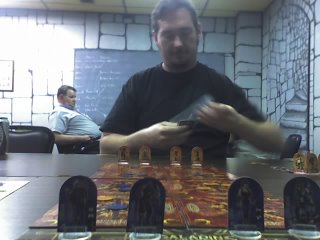 By this time, Ian had arrived, bringing his copy of Dungeon Twister (BGG, BUY ME!), a game I have been itching to play for some time now. This game pits two teams of eight adventurers (each with powers) against each other in a race to escape the dungeon, each player exiting where the other player starts. The various maze boards that make up the complete playing field can be rotated in a number of fashions, and start face down. Players pick a four-character starting team, then populate the board with item tokens and their other four characters. When a board is revealed, each player places their opponent's tokens in a pretty clever turnabout. Combat and action points are handled with cards- you eventually get back your action point cards, but combat cards are out of the game once used. I'd definitely play this again- there's a lot of strategy to this without it being overwhelming. I'd rank this as slightly heavier than the similar Wiz-War, as the luck factor barely exists except as the chaos of dealing with the repercussions of another player's moves- definitely a desirable quality! I intentionally was playing to learn rather than playing to win, so Ian got in a couple of good moves and trounced me, winning five to one. I'll probably buy this in the future.
By this time, Ian had arrived, bringing his copy of Dungeon Twister (BGG, BUY ME!), a game I have been itching to play for some time now. This game pits two teams of eight adventurers (each with powers) against each other in a race to escape the dungeon, each player exiting where the other player starts. The various maze boards that make up the complete playing field can be rotated in a number of fashions, and start face down. Players pick a four-character starting team, then populate the board with item tokens and their other four characters. When a board is revealed, each player places their opponent's tokens in a pretty clever turnabout. Combat and action points are handled with cards- you eventually get back your action point cards, but combat cards are out of the game once used. I'd definitely play this again- there's a lot of strategy to this without it being overwhelming. I'd rank this as slightly heavier than the similar Wiz-War, as the luck factor barely exists except as the chaos of dealing with the repercussions of another player's moves- definitely a desirable quality! I intentionally was playing to learn rather than playing to win, so Ian got in a couple of good moves and trounced me, winning five to one. I'll probably buy this in the future.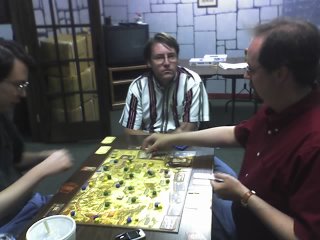 While Ian and I were locked in epic battle of cardboard, new Dan and the other two guys played Thurn and Taxis (BGG, BUY ME!), a new acquisition of new Dan's. This bad boy just won the Spiel des Jahres 2006, and is a creation of Andreas Seyfarth of Puerto Rico fame. To get you to understand the theme, this isn't a game about Mr. Thurn and his New York Taxi Service, say. This is more like Mr. Thurn and Mr. Taxis, the 16th century postal magnates, brewers, and castle-builders. The game is more about connections between cities, as I understand it, and not a game of pick-up-and-deliver. Looking at the board, I was reminded of Elfenland (Spiel des Jahres, 1998), but I haven't played that one, either. While I didn't have the chance to play T&T, I know the game went over well and everyone had fun. I don't know who won.
While Ian and I were locked in epic battle of cardboard, new Dan and the other two guys played Thurn and Taxis (BGG, BUY ME!), a new acquisition of new Dan's. This bad boy just won the Spiel des Jahres 2006, and is a creation of Andreas Seyfarth of Puerto Rico fame. To get you to understand the theme, this isn't a game about Mr. Thurn and his New York Taxi Service, say. This is more like Mr. Thurn and Mr. Taxis, the 16th century postal magnates, brewers, and castle-builders. The game is more about connections between cities, as I understand it, and not a game of pick-up-and-deliver. Looking at the board, I was reminded of Elfenland (Spiel des Jahres, 1998), but I haven't played that one, either. While I didn't have the chance to play T&T, I know the game went over well and everyone had fun. I don't know who won.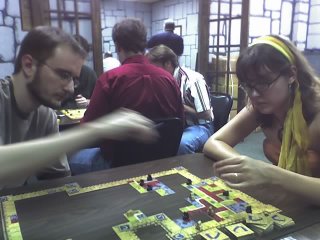 Simultaneously, Dan and Kelly broke out Carcassonne: the Castle (BGG, BUY ME!), another two-player game. I'm likely to play this at some point as a filler, but I'm generally lukewarm on Carcassonne. I'm not sure why this is so- I like tile-placement games, and I like little wooden pieces. I could simply be reacting negatively to the game because of its popularity. As for the Castle, it's a Reiner Knizia two-player adaptation of the basic Carcassonne theme: lay tiles, place
Simultaneously, Dan and Kelly broke out Carcassonne: the Castle (BGG, BUY ME!), another two-player game. I'm likely to play this at some point as a filler, but I'm generally lukewarm on Carcassonne. I'm not sure why this is so- I like tile-placement games, and I like little wooden pieces. I could simply be reacting negatively to the game because of its popularity. As for the Castle, it's a Reiner Knizia two-player adaptation of the basic Carcassonne theme: lay tiles, place meeples followers to score points, depending on territory. The scoring track forms a play arena, preventing the game from spreading too far; a good restriction for two players. I haven't played this one either, but I do know the clever thing is that the game has special wall tiles that you gain by landing exactly on certain scoring spaces- just passing over them doesn't cut the mustard. The wall tiles give you various small edges in scoring that can add some extra weight to the game. Again, I don't know who won- I'll leave it to the commentators.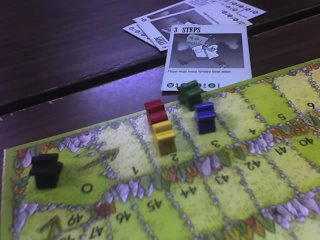 By this time, it had gotten a little late and we were searching for something to play. I requested that I pull out Zombie Rally (BGG, BUY ME!), as I wanted to give it a shot with more than two players. I picked this us last week for three reasons: it cost six bucks and just came out, I like to support small presses with one game under their belt, and it had the best tagline ever: "Let's get ready to shamble!" Sadly, I think the theme is the best part of this weak game. Everyone is a zombie racing against the others. You have a deck of cards that are 1, 2, and 3 steps, plus "take that" attack cards that knock off limbs. A zombie with two legs is walking. One leg means hopping. No legs and two arms is crawling. Just one arm is dragging.
By this time, it had gotten a little late and we were searching for something to play. I requested that I pull out Zombie Rally (BGG, BUY ME!), as I wanted to give it a shot with more than two players. I picked this us last week for three reasons: it cost six bucks and just came out, I like to support small presses with one game under their belt, and it had the best tagline ever: "Let's get ready to shamble!" Sadly, I think the theme is the best part of this weak game. Everyone is a zombie racing against the others. You have a deck of cards that are 1, 2, and 3 steps, plus "take that" attack cards that knock off limbs. A zombie with two legs is walking. One leg means hopping. No legs and two arms is crawling. Just one arm is dragging.
Q: What do you call a zombie with no arms and no legs?
A: Mat.
Actual rules text, people. The biggest shortcoming of this game, apart from seeming like a watered-down lamer Lunch Money and being printed on poor cardstock, is that it came with no good way to track arms, legs, and steps in the race. New Dan snagged a scoring board from one of the Carcassonnes, and we each had a little zombie on the track, plus extra ones in front of us to represent arms and legs. All in all, it went much much faster, but even with five players, the game just doesn't have that spark that makes it worth hitting the table.
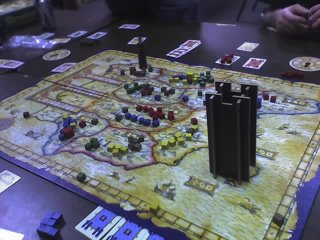 For our last game, new Dan pulled out one of the games from the crate, El Grande (BGG, BUY ME!). What a game this is! By playing Wolfgang Kramer's 1996 Spiel des Jahres winner, we truly had a grand send-off to the evening. El Grande is about region control- Ten regions of Spain, each giving differing points for first, second, and third place. Very loosely, you deploy your Caballeros to the regions to secure your position. You have a hand of thirteen cards which dictate turn order and number of Caballeros you can bring to bear each turn; it's inverted such that if you go last, you deploy the maximum number of guys and if you go first, you deploy none. Very elegant in its balance. Turn order matters because you are bidding on action cards that dictate how many guys you bring from your supply to the board and also have an optional special action. Actions include moving others' Caballeros, moving scoring markers, forcing a special scoring, and suchlike. There's more elements here, and I'm only giving a skeleton on an overview; I could talk a lot more about this one. Many kudos to new Dan for his excellent, well-explained how-to-play teaching. We didn't have to refer to the rules once during play, and every game element made sense after his explanation. That's not saying I had a perfect, razor-like grasp of the strategy, however. We had five players in our game of El Grande: Me, Nate, Dennis (?), Ian, and new Dan. Ian won, beating new Dan by 10-20 points, Nate was in the middle somewhere, and I made fourth place by a single point. Yay me, not last! I know that this title will hit the table again. (Dan and new Dan traded with each other for it, so I win either way.) When we wrapped, it was about 11:30 and the grognards had actually finished their 18XX game.
For our last game, new Dan pulled out one of the games from the crate, El Grande (BGG, BUY ME!). What a game this is! By playing Wolfgang Kramer's 1996 Spiel des Jahres winner, we truly had a grand send-off to the evening. El Grande is about region control- Ten regions of Spain, each giving differing points for first, second, and third place. Very loosely, you deploy your Caballeros to the regions to secure your position. You have a hand of thirteen cards which dictate turn order and number of Caballeros you can bring to bear each turn; it's inverted such that if you go last, you deploy the maximum number of guys and if you go first, you deploy none. Very elegant in its balance. Turn order matters because you are bidding on action cards that dictate how many guys you bring from your supply to the board and also have an optional special action. Actions include moving others' Caballeros, moving scoring markers, forcing a special scoring, and suchlike. There's more elements here, and I'm only giving a skeleton on an overview; I could talk a lot more about this one. Many kudos to new Dan for his excellent, well-explained how-to-play teaching. We didn't have to refer to the rules once during play, and every game element made sense after his explanation. That's not saying I had a perfect, razor-like grasp of the strategy, however. We had five players in our game of El Grande: Me, Nate, Dennis (?), Ian, and new Dan. Ian won, beating new Dan by 10-20 points, Nate was in the middle somewhere, and I made fourth place by a single point. Yay me, not last! I know that this title will hit the table again. (Dan and new Dan traded with each other for it, so I win either way.) When we wrapped, it was about 11:30 and the grognards had actually finished their 18XX game. For closure, Dan grabbed the demo copy of Munchkin (BGG, BUY ME!), which new Dan had never played. Kelly said she'd rather shoot herself in the head than play, and Ian passed on playing with a bit less dramatic gore. I totally understood their (IMHO valid) position, but I'm a good sport. Munchkin is good for the jokes, but not good for the game. We pushed through playing, and had some laughs, Dan won. One reviewer posits the game's success depends on fresh humor. With fourteen expansions and versions as of 2006, I can't disagree with the theory. It is what it is, however- a light, funny (if fresh), beat up on the leader, Steve Jackson game. For winning the Origins award for Best Traditional Card Game of 2001, I really want to go and look at the competition. Maybe someone got paid off.
People ask me why I take pictures of the game. I have no better response than "I blog," which beats "I'm a creepy stalker obsessive loon." I need to start bringing my real digital camera. That doesn't paint me in the best of light, now that I think about it. Oh well, this is hard-hitting realism for you.





1 comment:
Not much comment on the actual content of your article, however the tone and flavor of your writing was spectacular. Very entertaining. Great job Misch! Keep it up and I imagine your viewer base will grow dramatically!! This is your fortune cookie for the week.
Post a Comment